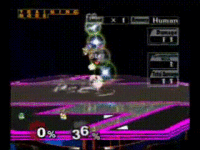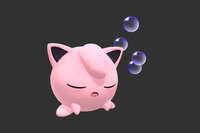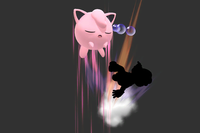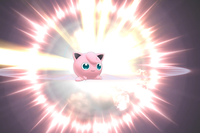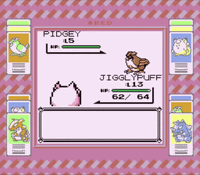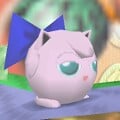Rest: Difference between revisions
Iron Warrior (talk | contribs) No edit summary |
m (Not a trophy) |
||
| Line 14: | Line 14: | ||
==Overview== | ==Overview== | ||
Jigglypuff turns toward the screen and falls asleep for about 3 seconds. Unlike the [[asleep|sleep]] state caused by other moves, Jigglypuff cannot wake up faster via [[button mashing]]. Before Jigglypuff falls asleep, any opponent in contact with it is instantly hit, with a [[ping]] sound being heard (except in the Japanese version of ''Smash | Jigglypuff turns toward the screen and falls asleep for about 3 seconds. Unlike the [[asleep|sleep]] state caused by other moves, Jigglypuff cannot wake up faster via [[button mashing]]. Before Jigglypuff falls asleep, any opponent in contact with it is instantly hit, with a [[ping]] sound being heard (except in the Japanese version of ''[[Super Smash Bros.]]'', where a normal strong attack sound plays). This attack is infamously known for its extreme [[knockback]], instant startup lag (as it hits on frame 1 in ''Smash 64'' and ''Super Smash Bros. Melee'' and on frame 2 in later games), very small range, and a long vulnerability period. Jigglypuff gains [[intangibility]] for about 25-30 frames (depending on the game) at the start of the move, approximately the time it takes to close its eyes; however, this is unlikely to protect the user in case of a miss due to the move's extreme ending lag. | ||
==In ''[[Super Smash Bros.]]''== | ==In ''[[Super Smash Bros.]]''== | ||
| Line 78: | Line 78: | ||
<gallery> | <gallery> | ||
Rest.png|Rest in Generation VI Pokémon games. | |||
</gallery> | </gallery> | ||
| Line 113: | Line 113: | ||
**The only other move that can apply a flower in ''Ultimate'' is [[Hero]]'s [[Hocus Pocus]], and that is only self-inflicted. | **The only other move that can apply a flower in ''Ultimate'' is [[Hero]]'s [[Hocus Pocus]], and that is only self-inflicted. | ||
*In ''Brawl'', if Jigglypuff lands while still asleep, its eyes will open for a single frame before closing again. | *In ''Brawl'', if Jigglypuff lands while still asleep, its eyes will open for a single frame before closing again. | ||
{{Special Moves|char=Jigglypuff}} | {{Special Moves|char=Jigglypuff}} | ||
| Line 123: | Line 124: | ||
[[Category:Jigglypuff (SSB4)]] | [[Category:Jigglypuff (SSB4)]] | ||
[[Category:Jigglypuff (SSBU)]] | [[Category:Jigglypuff (SSBU)]] | ||
Revision as of 17:03, August 1, 2022
| Rest | |
|---|---|
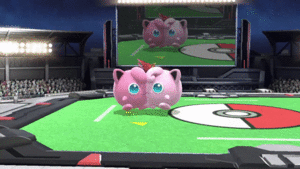 Rest in Ultimate. | |
| User | Jigglypuff |
| Universe | Pokémon |
| Article on Bulbapedia | Rest (move) |
Rest (ねむる, Sleep) (named Sleep on the original Super Smash Bros. website) is Jigglypuff's down special move in all games of the Smash series.
Overview
Jigglypuff turns toward the screen and falls asleep for about 3 seconds. Unlike the sleep state caused by other moves, Jigglypuff cannot wake up faster via button mashing. Before Jigglypuff falls asleep, any opponent in contact with it is instantly hit, with a ping sound being heard (except in the Japanese version of Super Smash Bros., where a normal strong attack sound plays). This attack is infamously known for its extreme knockback, instant startup lag (as it hits on frame 1 in Smash 64 and Super Smash Bros. Melee and on frame 2 in later games), very small range, and a long vulnerability period. Jigglypuff gains intangibility for about 25-30 frames (depending on the game) at the start of the move, approximately the time it takes to close its eyes; however, this is unlikely to protect the user in case of a miss due to the move's extreme ending lag.
In Super Smash Bros.
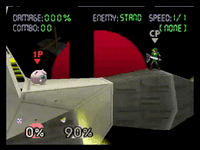
In Super Smash Bros., Rest is a powerful move that deals high damage and strong horizontal knockback. The move deals 20% and is capable of KOing most characters under 50% at the center of Dream Land. The move comes out instantly on frame 1 (although it is only active on this frame), has a reasonably sized hitbox and provides 29 frames of intangibility during its startup. However, the entire move takes 249 frames (over 4 seconds) to complete, which leaves Jigglypuff vulnerable for an extremely long period of time. When used on or above the stage, Jigglypuff's opponents have a lot of time to punish Rest and when it is used off stage, it leads to a guaranteed self-destruct unless something hits Jigglypuff upwards before it reaches the bottom blast zone.
Due of its frame 1 startup and powerful hitbox, Rest is an extremely effective combo finisher. Jigglypuff has a multitude of ways to combo into Rest for a KO, such as with a forward throw, up tilt, up aerial, or down aerial. These setups into Rest reduce the move's otherwise extreme risk to use.
In the original Japanese version of Smash 64, Rest was much weaker, only dealing 14% damage and much lower knockback (especially at lower percents). The move did not KO nearly as early as in the international versions, making the reward for landing it much lower. The move also did not make its signature "ping" sound effect. Rest was the only move Jigglypuff had which received a major change in the international version, being the main reason why Jigglypuff is considered better in the North American version. In the PAL versions of the game, Rest's hitbox size was noticeably reduced, which made the move harder to land than in NTSC versions. This smaller hitbox would be carried over to Melee.
In Super Smash Bros. Melee
In Super Smash Bros. Melee, Rest's already extreme power was exponentially increased. The move now deals 28% damage and it is capable of KOing most characters under 15% from center stage (on tournament legal stages) and it can even OHKO in certain situations (depending on the opponent's stage position and DI). Rest can still be combo'd into using some of Jigglypuff's moves (albeit not as reliably as in the previous game), such as up throw or up aerial. Because of this, Rest is an even more devastating tool than in the previous game and it is one of Jigglypuff's main ways to score KOes.
A minor change the move received was that it now has a flame effect rather than a normal effect, with the move now setting opponents on fire when it connects. The only downsides Rest has compared to its Smash 64 incarnation is that it has a considerably smaller hitbox (being the slightest bit smaller than its hitbox in the PAL versions of Smash 64) and its intangibility lasts for 3 less frames. These changes however are minuscule compared to its greatly increased power, making Rest one of Melee Jigglypuff's most defining moves, being one of the main reasons why Jigglypuff is considered to be a top tier.
In Super Smash Bros. Brawl
In Super Smash Bros. Brawl, Rest has seen some rather drastic changes, mostly for the worse. One positive change is that the move now has a flower effect, which enables the move to build up more damage after it connects (now being able to deal a maximum of 42%). Two more positive (albeit minor) changes are that the move has a slightly bigger hitbox and it has one more frame of intangibility.
One notable change is that the move now launches vertically. This makes the move much safer when it KOs opponents on the ground (as it will always cause a Star KO or Screen KO) and it can even still be somewhat safe when used off stage as it will still cause a Blast KO (granted that the opponent is not too close to the stage). However, this vertical angle also makes the move significantly less safe in the event that it does not KO.
However, the move has seen two negative changes. The first negative change is that the move now comes on frame 2 rather than frame 1, although this is mostly insignificant overall. The second and far more detrimental change is that the move has drastically reduced damage (only dealing 15% without the flower effect, nearly half as much as in Melee) and knockback (with Rest no longer being able to KO reliably until around 75% on middleweights). This makes Rest a far less useful move, being more of a high risk, low reward move than a high risk, high reward move. This change combined with the game's numerous universal changes have hindered Rest even further, as Jigglypuff now has no truly reliable ways to set up into it. The only setups Jigglypuff really has are with down aerial and from a jab lock, with the former being unreliable and only working at very high percents, while the latter is extremely situational. As a result, Rest is a far less effective move than it was in Melee, being one of the main reasons why Jigglypuff is considered to be so much worse in Brawl.
In Super Smash Bros. 4
Rest in Super Smash Bros. 4 has seen multiple changes which improved the move overall. The hitbox is larger and it now lasts for 3 frames rather than 1. In addition, the move now has 20 frames less ending lag (although the move is still incredibly punishable). The most beneficial change the move received however is that it now deals 20% damage, which grants it greater knockback. This means that Rest can now KO middleweights at around 50% and makes it a vastly more potent move overall. However, Jigglypuff still lacks reliable setups into Rest, especially with the changes to its down aerial, as well as with some other moves.
Additionally, there is now a chance that the move will cause a Blast KO on stage (due to universal changes), so even if the opponent is KOed, they can potentially now re-spawn and punish Jigglypuff, increasing the risk of using Rest even more, despite its decreased ending lag. On the other hand, this also means Jigglypuff will typically die after the opponent if the move is initiated offstage. Overall, while Rest was repurposed to be a lower risk, higher reward move, various changes (both universal and to Jigglypuff) have somewhat caused an opposite effect in a way, although it is still functionally superior to its Brawl counterpart.
In Super Smash Bros. Ultimate
Rest in Super Smash Bros. Ultimate now triggers a special zoom when it connects. Besides that, the move has seen multiple improvements with the move receiving a larger hitbox again (although it is still smaller than in Smash 64) and the move has less ending lag (especially when Jigglypuff lands the Rest), meaning it can actually recover from it for the first time in the series if the move is used high enough offstage. This reduces the risk of using Rest, although Jigglypuff's opponent can still punish it if it connects (granted that they get a Blast KO). Additionally, Jigglypuff has gained a few potential setups into the move; mainly with Pound and down aerial, due to their respective buffs. Overall, Rest in Ultimate is considerably improved compared to the previous two games, although it still pales in comparison to its Melee counterpart.
Instructional quotes
| Rest puts Jigglypuff into a deep sleep, but at the instant it drops off, an intense energy force radiates out of the exact center of its body. | ||
| Use it while touching a foe to unleash its hidden power. | ||
| Takes a well-earned nap that unleashes hidden power when touching a foe. |
Customization
Special Move customization was added in Super Smash Bros. 4. These are the variations:
| 1. Rest | 2. Leaping Rest | 3. Wakie Wakie |
|---|---|---|
| "A well-earned nap. Use it while touching a foe to unleash its hidden power." | "A well-earned nap…with added altitude. No one will disturb you all the way up there." | "A short yet peaceful nap. Oh, and you explode when you wake up. Not so peaceful, I guess." |
- Rest: Default.
- Leaping Rest: Launches Jigglypuff upwards while it falls asleep. While it has less knockback than Rest, it consists of a "striking" hitbox while jumping that can be comboed into more easily, having kill confirms out of up tilt and up air. Hitting with the early frames still causes a flower effect, though the strike does not. The initial hit does not KO until up to 45% later from the ground, with the strike KOing later, but having the ability to hit opponents very high up for early kills. Jigglypuff sleeps for 50% longer than the default. On stages like Kongo Jungle (64) with semi-soft platforms, it can be used as a last resort recovery move; however, it cannot be used on most stages, as Jigglypuff cannot grab ledges while asleep.
- Wakie Wakie/Wakey-Wakey (PAL): Loses its ability to send opponents flying when they make contact. When Jigglypuff falls asleep, it emits a pushing vortex, which can make the move harder to land, but can also protect Jigglypuff by pushing foes away. Jigglypuff stays asleep for just half the amount of time, then Jigglypuff will wake up with an explosion larger than the vortex, take 5% recoil damage, and inflict 15% flame damage to nearby opponents. The move is overall faster, with more startup but lower ending lag, despite the waking up animation having a frame speed multiplier of 2. The move has the potential to KO from 90% to 100%.
Origin
Rest is a Psychic-type status move introduced in Generation I. It puts the user to sleep for two turns in exchange for recovering all of their HP back to maximum and healing any status ailments. The two turns of sleep may leave the user open to their opponent's attacks or setup, unless the user has an item or Ability that can cure the sleep early or the user knows Sleep Talk.
In the Super Smash Bros. series, Rest also puts the user to sleep and leaves it vulnerable in exchange for a powerful effect, but instead of healing damage, it deals damage with very powerful knockback if used right next to a foe. While this has no canonical basis in the Pokémon series, Rest's depiction in Smash is similar in function to numerous powerful moves in the Pokémon games that leave the user open to attacks the following turn, such as Hyper Beam. In the description of one of its Melee Smash trophies, as well as in Snake's Codec Conversation about Jigglypuff, it is stated that this is because at the instant Jigglypuff falls asleep, a huge buildup of energy forms at the center of its body. This is an example of the Smash producers changing the functions of a move to suit the games; other examples of this from the Pokémon series include Withdraw, Double Team and Substitute.
In every Pokémon generation, Jigglypuff can learn Rest by leveling up, being one of the few Pokémon that can do so. Additionally, nearly every Pokémon can learn Rest via TM44 from Generation I to VII and TM21 in Generation VIII.
Gallery
Rest leaves Jigglypuff very vulnerable, particularly to strong attacks which require charging, like Lucario's Aura Sphere or charged smash attacks.
Rest in Super Smash Bros. for Nintendo 3DS.
Rest in Super Smash Bros. for Wii U.
Rest connecting with Pikachu in Super Smash Bros. for Wii U.
Names in other languages
| Language | Name |
|---|---|
| ねむる | |
| Rest | |
| Repos | |
| Erholung | |
| Descanso | |
| Riposo | |
| 睡觉 | |
| 睡覺 | |
| 잠자기 | |
| Rust | |
| Отдых |
Trivia
- The voice clip Jigglypuff uses when waking up from Rest in the original Super Smash Bros. was moved from Melee onward to its usage of Rollout, instead receiving a new voice clip for the aforementioned Rest wakeup. Additionally, Jigglypuff vocalizes twice in Smash 64 while asleep, while it only does so once in the rest of the Smash games.
- In Brawl and Smash 4, Rest is the only move in the series that can inflict the flower effect that is neither a custom special move or a Final Smash.
- The only other move that can apply a flower in Ultimate is Hero's Hocus Pocus, and that is only self-inflicted.
- In Brawl, if Jigglypuff lands while still asleep, its eyes will open for a single frame before closing again.
